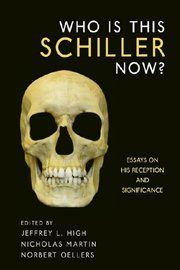Book contents
- Frontmatter
- Contents
- Foreword
- Acknowledgments
- List of Abbreviations
- Introduction: Why Is This Schiller [Still] in the United States?
- Part I Schiller, Drama, and Poetry
- 1 Lenz und Schiller. Die erlebnissymptomatische Dramensprache
- 2 Melancholy in Schiller's Dramas
- 3 Schillers Ästhetik der Trauer. Der Dichter als “elegischer” Lyriker und Dramatiker
- 4 Glühendes Wort zum Ideal über der versagenden Realität — zu Schillers Balladen
- 5 Zwischen Max Piccolomini und Buttler. Wallensteins Orts- und Zeitverluste
- Part II Schiller, Aesthetics, and Philosophy
- Part III Schiller, History, and Politics
- Part IV Schiller Reception — Reception and Schiller
- Part V Schiller Now
- Notes on the Contributors
- Index
2 - Melancholy in Schiller's Dramas
from Part I - Schiller, Drama, and Poetry
Published online by Cambridge University Press: 05 February 2013
- Frontmatter
- Contents
- Foreword
- Acknowledgments
- List of Abbreviations
- Introduction: Why Is This Schiller [Still] in the United States?
- Part I Schiller, Drama, and Poetry
- 1 Lenz und Schiller. Die erlebnissymptomatische Dramensprache
- 2 Melancholy in Schiller's Dramas
- 3 Schillers Ästhetik der Trauer. Der Dichter als “elegischer” Lyriker und Dramatiker
- 4 Glühendes Wort zum Ideal über der versagenden Realität — zu Schillers Balladen
- 5 Zwischen Max Piccolomini und Buttler. Wallensteins Orts- und Zeitverluste
- Part II Schiller, Aesthetics, and Philosophy
- Part III Schiller, History, and Politics
- Part IV Schiller Reception — Reception and Schiller
- Part V Schiller Now
- Notes on the Contributors
- Index
Summary
This paper uses the 2,500-year old tradition of melancholy to reframe the discussion of what has, since Hegel's appalled reaction to the ending of Wallenstein, been thought of as the historical pessimism of Schiller's tragedies. The argument works on three levels. First, it reveals the variety of ways in which Schiller's characterization makes use of the melancholy tradition, in terms of iconography, costume, and behaviour. Second, it shows how melancholy informs key themes and structures in the plays: pathology and passivity; usurpation and revenge; authority and legitimacy. Finally, it argues that the atmosphere of pessimism hanging over Schiller's denouements — specifically the incidence of suicide or near-suicide and the symbolic extinction of beauty from the earth — relates directly to the melancholy tradition.
THE TRADITION OF MELANCHOLY in the literary and visual arts is one of the longest and most diverse in Western culture. It has been a continuous presence since Hippocrates in the fourth century BCE and has enjoyed periodic artistic flowerings, for instance in the Italian Renaissance, Elizabethan and Jacobean England, and the late eighteenth century in Germany. As for diversity, the tradition of melancholy has taken many different forms: medical theories of melancholia; characterology of the melancholy temperament; astrological and neo-Platonic theories of Saturnian melancholy; religious melancholy, for instance in Puritan and Pietist devotional literature and conversion narratives, or the Enlightenment critique of enthusiasm; the tradition of consolation for melancholy in moral philosophy and Christian teaching; the iconographical tradition in the visual arts; musical melancholy; and various literary traditions, such as Elizabethan and Jacobean dramatic melancholy, Baroque vanitas poetry, and the eighteenth-century “graveyard school” of poetry.
- Type
- Chapter
- Information
- Who Is This Schiller Now?Essays on his Reception and Significance, pp. 37 - 54Publisher: Boydell & BrewerPrint publication year: 2011



